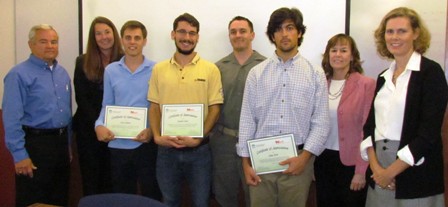|
Click on photo to view larger image


|
If “people, planet and profit” are the triple bottom line of sustainability, then the 2012 Pollution Prevention (P2) Intern Program has met all three through environmental benefits, cost savings and the training and development of three engineering students now equipped with valuable experience in P2 methods and measurements.
MDE and the University of Maryland, Maryland Technology Enterprise Institute (MTECH) have partnered since 2000 to offer engineering students the opportunity to put their training to work at Maryland manufacturing facilities. Three undergraduate engineering students participated in the program during the summer of 2012 and were supported by a combination of funding from the participating companies and federal and state grants. They were tasked with identifying opportunities that reduce waste, energy and water usage at the source. They then presented their final reports to the participating businesses, MDE and University of Maryland faculty and staff on October 24 in College Park.
Recommendations presented to the three host companies, Sims Recycling Solutions (formerly known as E-Structors), Phoenix Mecano and TAMKO, amounted to more than $670,000 in annual savings, more than three tons of annual waste reduction and significant energy savings.
Sims Recycling Solutions
Sims Recycling Solutions is an electronic recycling and IT asset disposition firm in Elkridge. Trevor Skibbens, now a senior studying civil engineering at the University of Maryland, was involved in a number of projects including analyzing and reducing the waste stream, decreasing energy usage, improving shipping methods, optimizing the recycling of E-ZPass transponders and encouraging employee carpooling and transit use.
“Dumpster dives,” or analyzing the content of a company’s dumpster or trash compacter to understand what materials are leaving a facility, is often a staple of P2 opportunity assessments. Skibbens conducted this analysis over a period of several days and identified new recycling markets for almost 30 percent of the waste stream by weight, or 90,000 pounds per year. He also provided the company a cost-benefit analysis of the installation of light sensors in the warehouse area, showing the potential to reduce electrical use by 88,000 kilowatt hours of energy a year. Skibbens also developed an efficient process for deconstructing and recycling E-ZPass transponders and analyzed the use of recycled microfiber “supersacks” provided by a nearby sugar company in place of cardboard gaylord boxes, which are not as durable and are not always returned by customers.
In total, Skibbens identified opportunities that would save the facility approximately $69,000 while reducing waste and energy usage. Gaining exposure to a variety of projects and taking responsibility for implementation made for a positive summer experience.
“I never expected that I could lead projects myself and save an already efficient company thousands of dollars,” Skibbens said. Small changes get amplified in large companies.”
Phoenix Mecano, Inc.
Phoenix Mecano Inc., which supplies a diverse range of products for the machine, automotive, healthcare, telecom and industrial electronics sectors, is in Frederick. The company hosted intern Adam Davis, a senior Fire Protection Engineering student at the University of Maryland, College Park. Davis was tasked with projects involving paper conservation, assistance with an Industrial Assessment Center Energy Audit, shrink wrap recycling and a lean manufacturing project.
Davis implemented a paper use reduction initiative that involved placing stickers in areas of paper consumption such as paper towel dispensers to remind employees that “These Come from Trees.” Case studies show a reduction in paper consumption of almost 30 percent when these stickers are used, meaning potential annual savings of $1,611 at Phoenix Mecano. Davis also introduced the recycling of shrink wrap that comes in on the shipping containers.
During Davis’ internship, the Industrial Assessment Center at the University of Delaware, which serves the mid-Atlantic area, performed a one-day energy audit. He assisted in their visit by providing information and reviewed their report, which proposed changes related to compressor leaks, temperature adjustments and the use of automatic settings. Altogether, these changes would cut 16 percent of total energy costs, or $16,770 per year. Davis was also involved in a visit by Energy Efficient Technologies, resulting in conservation recommendations that would yield energy savings of $14,318.
TAMKO Building Products
Matthew Eshed, a May 2012 graduate of the University of Maryland, College Park, with a degree in mechanical engineering, was placed at TAMKO Building Products, which manufactures asphalt roofing shingles at its plant in Frederick. Eshed’s work was focused on a roofing granule reclamation project. His task was to develop a cost-benefit analysis and implementation plan for a system to reclaim granules from cooling section sludge and devise a process for removing the water and waste fines to recover the reusable materials.
In addition to designing a system and layout for the plant, Eshed made recommendations on the type of equipment needed to move, dry and sort the sludge. Depending on whether the recovered waste granules are reused onsite in the manufacturing process or sent to a local company for use in farm road pavement, the annual savings would range from $350,000 to $580,000.
TAMKO was pleased with the outcome, and Eshed also felt he benefited from the experience, saying: “The program gave me the opportunity to see how the knowledge and engineering skills I gained from Maryland's undergraduate engineering program can be applied in a real-world setting, using MDE's goals as a framework for reducing environmental impact as much as possible.”
MDE is seeking manufacturers to host P2 engineering interns for summer 2013. The interns are selected by MTECH and receive training and assistance throughout the program. For more information on the P2 Intern Program and other P2 technical assistance programs, contact MDE P2 and Sustainability Coordinator Laura Armstrong at 410-537-4119 or [email protected]
|
